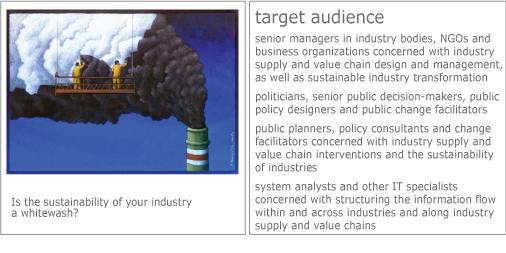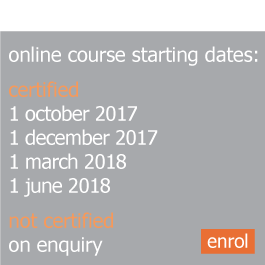biomatrix
industry design course

why the course is needed
Industries emerge from self-interest driven organizational behavior along industry supply chains. Instead of giving rise to the common good, they give rise to complex societal problems (ranging from poverty to climate change).
Many industries suffer from legacy structures that are unsustainable (e.g. non-renewable energy producers). They impact negatively on the planet and society and prevent the introduction of sustainable solutions. Sustainability related improvements to individual organizations within an industry have relatively little impact in terms of creating a sustainable and more developed world. It is often referred to as “greenwashing”.
To make a significant difference requires the redesign of the whole industry value / supply chain by all its stakeholders. Based on a sustainable industry design, they can plan the phasing out of unsustainable sub-industries and the phasing in of sustainable ones.
Creating a sustainable industry requires a shift in worldview to (w)holistic thinking.
what the course is about
The course explains how to transform an industry through engaging its stakeholders in redesigning it, planning the implementation of the design and implementing it. Thereby its complex problems get dissolved, the industry becomes sustainable and produces more beneficial outcomes for all its stakeholders.
It presents the key concepts of (w)holistic thinking, including the principles associated with the seven forces of organization (environment, ethos, aims, process, structure, governance and substance) that co-produce all systems. It applies this knowledge to activity system design in general and industry (re)design specifically.
Like all activity systems, an industry and its sub-industries are organized as a value / supply chain. The course deals with industry design from both a value (i.e. outcomes) perspective and a supply perspective (i.e. the use of resources and their configuration and continued flow in time and space). It also covers both the strategic and operational perspectives.
The course also deals with the theory and methodology of implementation planning, change management and stakeholder facilitation.
become a (w)holistic leader and manager
Participation in the Biomatrix Industry Design Course will transform you into a (w)holistic thinker based on Biomatrix theory.
You will understand the theory and methodology of complex problem (dis)solving, as well as activity system (re)design, development and change in general and that of an industry specifically. Throughout the course you are guided by template-based assignments to apply this knowledge to a chosen case study (e.g. the industry of which you are a part). You will also make an implementation plan for your design.
Once you have completed the course, you will be confident and able to
- assess and contextualize other tools and methods used in industry related change interventions
- act as a consultant and change manager in (w)holistic industry (re)design
- act as a learning facilitator and change manager in an in-house delivery of the Biomatrix Industry Transformation Programme to an industry or governance body concerned with transforming the industry.
course content
The course consists of five e-learning modules. During each module, the participants apply the learned theory in template-based exercises to their case study system and reflect on the theory and methodology.
module 1: overview of general and biomatrix systems theory
This module explains the key concepts and methods of systems and complexity theories in general and of Biomatrix systems theory specifically. Self-reflection assignments promote a (w)holistic view of the world and of sustainability.
module 2: systemic problem (dis)solving
This module explains the theory and practical steps involved in complex problem analysis and dissolving them through ideal system redesign. Assignments guide problem analysis and brainstorming of solutions for the case study system.
module 3: seven forces of system organization (activity system perspective)
The module explains activity systems as value and supply chains based on seven organizing forces and their organising principles. Assignments guide the ideal redesign of the case study system.
module 4: implementation planning
This module explains how to make an implementation plan for an ideal design. Assignments guide the implementation planning of the case study design.
module 5: change management design
This module explains the theory and practical steps involved in managing the transformation of a system with stakeholder participation and alignment. Assignments guide the change management planning for the transformation of the case study system.

see other courses and programmes
The Industry Design Course is one of several Biomatrix Design Courses which educate senior managers and decision-makers in the theory and methodology of sustainable system (re)design and complex problem solving. The courses are based on Biomatrix theory which explains how systems are organized, change and develop.
project design course
function design course
business process design course
organization design course
public/private partnership design course
public policy and governance design course

duration of the course
The average duration of the course is 8 months based on 1 day per week (i.e. about 33 days), to be completed within a year.
However, some participants could take considerably less or more time to complete the course, depending on their mode of study, work experience and nature of case study.
fee
We offer two pricing options for the self-managed course. The content and assignments remain the same.
$1100 – includes certificate from Stellenbosch University, feedback from BiomatrixWeb, prescribed starting dates.
$800 – no feedback, no certificate, no prescribed starting dates.
certification
On successful completion, the participants may receive a certificate in Industry Design from Stellenbosch University, South Africa.
admission requirements
No formal qualifications are required. Ideally the participants have a tertiary education as well as management experience.
in-house delivery
Our courses can also be delivered in-house. Please contact us to discuss your needs.
course developer and facilitator
Dr. Elisabeth Dostal is the developer and facilitator of the online Courses for Sustainable System Design based on Biomatrix theory (which she co-developed) and the Biomatrix design methodology.
Her areas of expertise are futurism, systems thinking and strategic management. She acted as a management consultant to business organizations, NGOs and government departments on issues of organization development and restructuring, as well as strategy and public policy design.
x
Stuck? Contact us at admin@biomatrixweb.com.

